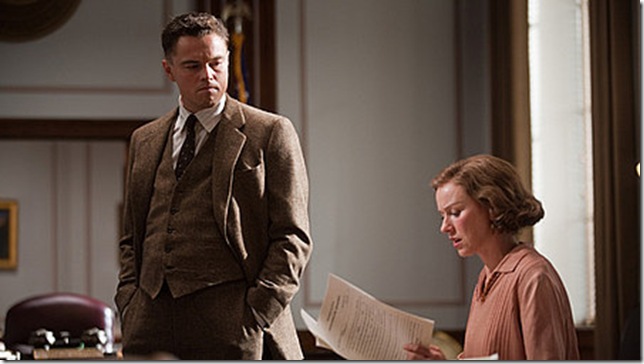When I was a kid, before I knew who J. Edgar Hoover was, I associated him with cross-dressing. I’m not alone.
“Cross-dressing” is the seventh-most-popular Google search accompanied with the phrase “J. Edgar Hoover,” behind “movie,” “biography,” “trailer,” “building,” “president” and “black” (something about Hoover’s rumored African-American ancestry). It tops even “FBI” in public interest.
Yet this apparently alluring facet of Hoover’s controversial life takes up all of one minute of Clint Eastwood’s 137-minute biopic J. Edgar, and it’s the most unconvincing moment of an otherwise credible feature. Slipping on his immediately expired mother’s pearls and frock before collapsing to her bedroom floor like a sack of shameful potatoes, Hoover’s (Leonardo DiCaprio) breakdown is supposed to be a catharsis – with his disapproving mom (Judi Dench) no longer silencing his urges, he can finally be the person he always knew he was inside.
It’s all very neat and tidy and screenwriterly; Robert McKee would attest that it holds up soundly as a dramaturgical device. But it feels nothing like life. Are we to believe that Hoover never fancied himself in women’s attire until the very moment his mother’s corpse turned cold?
And Eastwood leaves the subject at that – no more questions, please; nothing to see here. That’s because, by the looks of it and considering Eastwood’s oeuvre, he wasn’t comfortable with the subject matter. Say what you want about the liberal, antiwar nature of some of Eastwood’s movies in the 2000s, but the man is an old-fashioned, conservative filmmaker.
Rather than take a definitive stance on Hoover’s sexuality, his policy is closer to “Don’t ask, don’t tell.” The relationship between Hoover and longtime (business) partner Clyde Tolson (Armie Hammer) is suggested in a few moments of furtive glances, PG-acceptable dialogue and vanilla hand-holding, with just one moment of very effective physical intimacy that leaves us, like Tolson, wanting more.
I can’t imagine this seemingly tepid final product meeting the full approval of screenwriter Dustin Lance Black, who has specialized in similar docudramas about gay figures; he wrote Milk and Pedro. The only facet of Hoover’s life that makes this a personal project for Black was thus given short shrift.
Where Eastwood does succeed is in providing a multifaceted, warts-and-all portrait of Hoover’s strengths and weaknesses, his innovations and embarrassments, in the Old Master style of technical flawlessness he’s honed over four decades of storytelling. You may be disappointed at times, but you’ll never be bored.
The film alternates between two time periods: The 1920s-30s, when the upstart Hoover becomes the first head of the nascent FBI, and the 1960s and early ‘70s, when Hoover was an aging, paranoid coot still assailing the bogeymen of bygone eras – Bolsheviks, gangsters, etc. It’s a solid structure, even if it omits a huge swath of Hoover’s FBI tenure.
DiCaprio’s performance is Oscar-angling, and he may finally get one; his Hoover is the actor’s best portrayal of a crazy, privileged eccentric since The Aviator.
A word about the makeup, however: J. Edgar is only the latest Hollywood film to Benjamin Buttonize its characters, with DiCaprio’s “old Hoover” never appearing to be anything more than the illusion it is. At first we’re so distracted by the hours of pre-production to create this magic trick that is takes away from the performance. Even worse is the elderly makeup applied to Hammer, whose Tolson is an unintentionally unsettling human freakshow extracted from Tales From the Crypt.
There’s no question that J. Edgar is a work of evenhanded quality. You’ll walk away with an understanding of Hoover’s accomplishments — he’s credited with creating the foundation for police fingerprinting, nobly battling government forces resistant to science and technology — and his deep character flaws: He was a delusional, megalomaniacal perjurer who employed insidious tactics to slander anyone who opposed him.
As for the more sordid details of Hoover’s sex life, I would like to see a movie that takes a bolder stance — perhaps a Hoover film written and directed by Todd Haynes — as opposed to Eastwood’s delicate game of dodgem. For now, this enigmatic figure will have to remain in the celluloid closet.
J. EDGAR. Director: Clint Eastwood; Cast: Leonardo DiCaprio, Armie Hammer, Naomi Watts, Judi Dench, Dermot Mulroney, Josh Lucas, Ed Westwick; Rating: PG-13; Distributor: Warner Bros.; Opens: Friday at most area theaters
